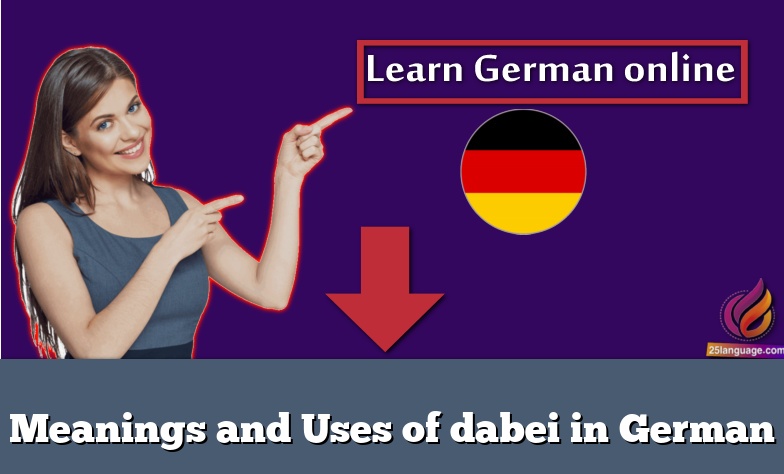Meanings and Uses of dabei in German

dabei in German.We use this word a lot in German with different meanings depending on the context. In this post I explain its different uses.
1. dabeihaben: to carry/have something with you
This verb is separable. You can see its conjugation here.
Example: Haben Sie Ihren Personalausweis dabei?
(Do you carry/have your national ID with you?)
2a. dabei sein: to be in (a plan)/to be there
Verbal expressions with sein are always written separately.
Examples: Kaufen wir zusammen ein Geschenk für Sarah? – Klar, ich bin dabei! (Shall we buy a present for Sarah together? – Sure, I’m in!)
Letztes Jahr sind wir in den Dolomiten gewandert! – Ich weiß, ich war dabei! (Last year we hiked in the Dolomites! – I know, I was there!)
2b. dabei sein (etwas zu tun): to be doing something/to be “on it”
There are 2 expressions with a similar meaning:
- The fixed expression Ich bin dabei means “I’m on it” (= I’m doing it right now/I’m about to do it [right now]).
- The verbal expression dabei sein, etwas zu tun corresponds to the English gerund in “I am doing something”.
Example: Ich bin dabei, das Essen zu kochen. (I’m cooking the meal.)
3. Use as an adverb
Derived from the meaning explained above (to be doing something), this word can be used as a simple adverb, i.e. alone, without any of the verbs listed above.
But the meaning remains the same: “something happens while you are doing something”, thus also “at the same time”. Example:
Er wollte den Müll in den Eimer werfen und dabei fiel er hin.
(He wanted to throw the trash in the bin and “[by/while] doing that/so” he fell.)
4. Use as a prepositional pronoun
If we use a verb with the fixed preposition bei, e.g. helfen bei, we must use dabei either
- as a pronoun for something that has just been mentioned:
Ich muss mein Zimmer aufräumen. Hilfst du mir dabei? (= beim Zimmeraufräumen)
(I have to tidy up my room. Can you help me with that?) - or as an introductory particle for the following subordinate clause: Kannst du mir dabei helfen, mein Zimmer aufzuräumen?
(Can you help me tidy up my room?). In this case, the pronoun is not mandatory.
5. Use as a conjunctional adverb (connecting sentences): (al)though, however
Example: Sie/Er wollte mich küssen, dabei hatten wir uns gerade erst kennengelernt!
(She/He wanted to kiss me, although we’d just met each other!)
The meaning of “dabei”

the meaning of “bei”
Bei is a preposition. Preposition?! More like Crapositions. Boom.
They really are a pain in the butt because they’re essentially like Thomas on Tinder – they just never match. Each language uses different prepositions for different contexts and you can’t really say preposition A in one language translates to preposition B in the other. Sometimes it does, but more often it doesn’t. Let’s take for, for example… yes, it can mean für. But also a bunch of other things:
- for example – zum Beispiel
- asking for – fragen nach
- for this reason – aus diesem Grund
- waiting for – warten auf
Ugh, learning prepositions really sucks!
And it’s kind of similar with bei, though not as bad.
It is clearly the other brother of the English by, but the two have a somewhat different core.
So what’s the core of bei? We could call it “proximity”; or in normal terms, bei expresses the idea of
“being with or at something or someone”
In practice, bei is THE word you need to express that you’re with a person.
- Thomas ist bei Maria.
- Thomas is at Maria’s place
- Ich habe gestern bei einer Freundin geschlafen.
- I slept at a friend’s place yesterday
- Ich bleibe bei dir.
- I’ll stay with you
- And it’s also used in context of being “at” some sort of event or activity.
- Ich höre gerne Musik bei der Arbeit.
- I like listening to music while working/at work.
- Ich hab’ mir gestern beim Computerspielen den Finger gebrochen.
- I broke my finger (while) playing computer yesterday.
- Thomas hat seinen Chef beim Rummachen mit der Sekretärin gefilmt.
- Thomas filmed his boss (as he was/while) making out with the secretary.
- Here, the activities were packed as a noun, but we can also express them using a sentence with a verb. And then we’d use dabei to refer back to that sentence.
- Ich habe ein Spiegelei gemacht und dabei telefoniert.
- I made an egg “sunny side up”.(lit.: “mirror egg”) and while doing that, I made a phone call.
- “Was ist denn mit Maria? Die läuft so komisch.”
“Die hat gestern im Yoga den “Zerstörer des Universums” versucht und dabei hat sie sich verletzt.” - “What’s up with Maria? She’s walking so strangely.”
“She tried the “destroyer of the universe” in yoga class yesterday, and she injured herself doing it (lit.: thereby).” - So here we’ve essentially combined the “at something” of bei with the standard “normal” function of da-words as we’ve learned in the general post.
And with this in mind we shouldn’t have a problem understanding the super common phrasings with dabei.dabei sein
Do you have an idea what it could mean?
Exactly, dabei sein means to be with something, at something, part of something. It can be used in the sense of an item being among a set of other items.- Ich habe circa ein Dutzend Hosen anprobiert, aber es war keine passende dabei.
- I tried on about a dozen pairs of pants but there was not a fitting one among them. (lit.)
- In der Bar gibt es 100 verschiedene Biere. Da ist auf jeden Fall ‘was für dich dabei.
- The bar has one hundred different beers. There is definitely something for you among them.
- But the more important use is in the context of people being present at or part of some activity – be it as … uhm, a bystander, or an active part of the uhm, action.
- Sei live dabei wenn die besten Köche um den Sieg singen!
- Be there live when the best chefs sing for the crown
- “Wir fahren an den See grillen. Hast du Lust.”
“Auf jeden Fall. Bin dabei.” - “We’re going to the lake for a BBQ. Wanna come?”
“Definitely. I’m in. - Here, the focus was on some sort of event. But it’s also used in contexts of you doing something right that moment.
- “Wolltest du mir nicht ein paar Fotos schicken?”
“Bin grad’ dabei.” - “Didn’t you want to send me some pics?”
“I’m at it/doing it right now.dabei haben
I don’t think this needs much explanation. Dabei haben means that someone has something with them. What’s the da doing here exactly? Well, I guess we could see it as pointing to whatever we’re doing, but don’t think about it too hard. You know, sometimes German doesn’t actually make much sense… what? Oh, you found that out already? Oh, uhm… how’d you find out this well kept secret ;)?
Anyway, examples.- Die Aliens hatten nicht genug Treibstoff dabei und wollten deshalb etwas von meinen Pflanzen.
- The aliens didn’t take/have enough fuel with them/on their journey and that’s why they wanted some of my plants.
- “Wolltest du mir nicht ein paar Fotos schicken?”





























